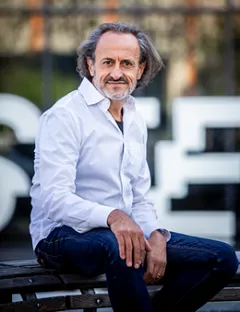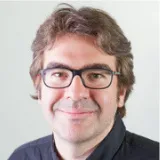Please note: this event has passed
Join Professor Giorgio Scita of IFOM ETS - The AIRC Institute of Molecular Oncology, & University of Milan for a research seminar as part of the Force Talk series entitled "Tissue fluidification in pathophysiology".
Abstract
The process in which locally confined epithelial malignancies progressively evolve to become invasive cancer cells is associated with the acquisition of cell motility, fostered by a tissue-level phase transition (PT) from a solid-like to a liquid-like state, known as unjamming. The biomolecular machinery behind unjamming and its pathophysiological relevance have only begun to be unravelled. Using a combination of physical approaches, ex vivo and in vivo model systems, we will address these issues and discuss whether an endocytic-driven PT between “solid” and “liquid” states of cell collectives is a complementary gateway to cell migration in pathology, focusing specifically on the progression of early breast cancer lesions that become locally invasive. We will show how the dynamic changes associated with PT feature the coexistence of long-range coordinated motion and local cell re-arrangement and are sufficient to promote matrix remodelling, and local invasion and exert mechanical stress on individual cell nuclei. This is accompanied by profound transcriptional rewiring, with the unexpected activation of an inflammatory response, change in cell state, and the emergence of malignant traits. Noticeably, carcinoma is composed of a heterogeneous set of cells that differ not only in their genetic landscape but also in their mechano-phenotypes. The impact of mechano-heterogeneity on tissue-level jamming transition is poorly understood. Here, we will also discuss unpublished findings that suggest that contact percolation, a purely geometrical feature, can impact the collective migratory behaviour of tissues and, strikingly, promote the activation of an inflammatory gene transcription program in normal and breast carcinoma models.

Speaker
Giorgio Scita is Principal Investigator at IFOM ETS - The AIRC Institute of Molecular Oncology, Milan and professor of General Pathology at University of Milan. His primary research interest has been on dissecting basic mechanisms of cell migration and invasion focusing on signalling leading to spatial and temporal regulation of actin dynamics: the powerhouse for cell motility. More recently, he has been investigating the biomechanics of collective cell migration, tumour plasticity and dissemination, focusing specifically on the tissue-level solid-to-liquid-like transition underlying human breast ductal adenocarcinomas progression.
He is ERC awardee (ADVANCED-2011; SYNERGY-2022) and EMBO member since 2014.
He has authored more than 150 publications, which include more than 120 original articles and 12 invited reviews in refereed journals. The average impact factor of these publications is slightly above 10. H factor: Currently, Scita has an overall Hirsch "h" factor of 71 (google Schoolar), 60 (Scopus).
How to join:
This event will take place online via Microsoft Teams. Register for this event to receive the meeting link and be notified of updates.
If you would like to receive updates on all upcoming Force Talks sign up to our mailing list.
Mechanics of Life Leverhulme DSP Force Talks Series
Force Talks is a seminar series hosted by the Mechanics of Life Leverhulme Doctoral Scholarship Programme at King's College London. We are honoured to welcome world leaders in mechanobiology.
The series aims to showcase the rapidly expanding interdisciplinary field of mechanobiology and mechanical forces. We welcome those from academia and industry to attend and take part in the discussions.

The programme is funded by the Leverhulme Trust doctoral scholarship grant "Understanding the mechanics of life".
Learn more about the Mechanics of Life Leverhulme Doctoral Scholarship Programme

